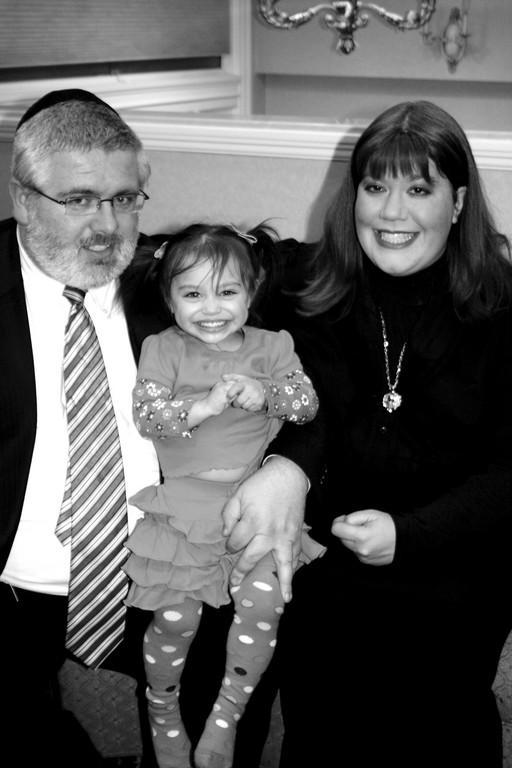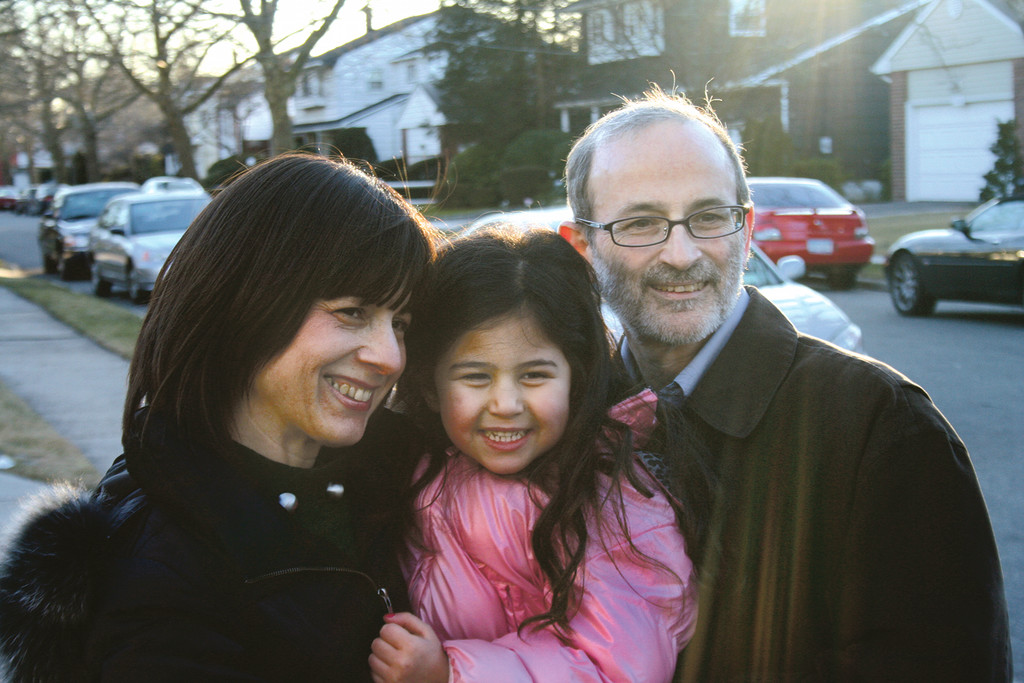Calling all parents:OHEL seeks foster homes
Three speakers sat on stools in front of a rapt audience of 25 men and women in the Ganz family home in Woodmere Saturday night, explaining the ups and downs, ins and outs of foster parenting.
In the first step of a long process to recruit potential parents through OHEL for foster children, OHEL presented the fourth recruitment meeting in two years, noted Derek Saker, Director of Communications for OHEL Children’s Home and Family Services. “We are always looking to increase the pool of foster parents,” he said. “There is a shrinking pool of parents available to take foster children.” Currently, OHEL has 70 foster parents in their jurisdiction but they are having recruitment meetings “because there is a greater need for more foster parents.” He said the need is “especially acute” for adolescents and children with special needs.
“There isn’t a number of how many foster parents are needed,” said Saker. “We can’t predict how many foster children will come into foster care at a given time. We need many foster parents from diverse backgrounds and with various family compositions to find the best match to meet the individual needs of the children.”
Some of the speakers at the meeting discussed their personal experiences as foster parents. Sara and Azriel Ganz have been foster parenting for 14 years. They ultimately adopted a foster child in their care four years ago. “She’s my daughter, just like the others,” said Azriel. Parents and OHEL staff noted that a foster parent has to care for the child’s physical and emotional well being and education, and work toward the goal of returning the child to the biological parents. A foster parent has to be certified, they and the home environment are assessed and they have to go through training. Each placement has to be approved by OHEL and the foster parents and family.
The same qualities that make a good parent make a good foster parent, said one of the parents. “Patience, loving, caring,” she said. “The child has been through so much, the child is not a blank slate; they have suffered abuse and neglect. The parent has to build the child up, their confidence is at an all time low and they are coming from a difficult situation. But it is amazing, you get back, you get so much from it. I certainly recommend it.” Another parent said, “It’s an amazing experience, it’s challenging. You bring life to the kids. There is nothing greater then that.” OHEL, they said, seeks the best match for the child, the parent that best meets the child’s needs.
OHEL and ACS cover the child’s financial needs: tuition, medical bills, therapy, board, clothing, but said Azriel, “if you are in it for the money you’re in the wrong business.”
OHEL was started 42 years ago as a foster care agency, Saker explained. At the time, he continued, Jewish children were removed from homes because of abuse and neglect and put in non-Jewish homes. An outcry from the Jewish community led to OHEL’s birth. The New York City Administration for Children’s Service (ACS) is ”responsible for the welfare of children.” If a child is abused, neglected or in danger, the police and ACS, a legal government body, is called in and if the child is determined to be Jewish then ACS contacts OHEL. “It’s important to have foster parents so that Jewish children can be placed with Jewish families,” stressed Saker. There are no orphanages, he said; the children are placed in a “home like yours and mine. They are removed from their birth homes temporarily and placed in qualified foster homes throughout the communities” mostly in New York City. “Nassau families can become OHEL foster parents,” he pointed out. “We do have OHEL qualified foster families in Nassau County. While OHEL does not have any foster contract with local Nassau County social services, we have and do sometimes place kids from New York City in Nassau County homes.”
Over 2,500 foster children have been processed by OHEL and their stays in foster homes can range from one day to 18 years, depending on the decisions of the courts. The “focus of foster care,” stressed Saker, is to “try to keep the biological child with the biological parents.” He explained that when a woman gives birth in a New York hospital she is given a drug test. If she tests positive, the child is removed from the mother and placed in foster care. If the child is Jewish, OHEL is immediately contacted. If the mother is in a rehabilitation program, the child is returned; if not, the child is put in extended foster care or adopted. “It has to be a safe and thriving environment for the child,” Saker emphasized. The court frees the child for adoption if there is a “total breakdown of the family,” or the parents don’t want the child.
Saker said that OHEL is a foster care agency not an adoption agency but the foster care sometimes evolves into adoption. He noted that although there are many types of foster parents they can be divided into two groups. He classified one group as a middle class family with their own children who see foster parenting as an opportunity for the family to understand how fortunate they are, said Saker. They very much want to help the foster child and want to expose their children to reality to see and take in children who lack, a home, and a mom and dad.
The second group, he said, is a childless couple who desperately want a child and take a foster child hoping that the child will be freed for adoption. “It can be an absolute roller coaster,” warned Saker. When a child is placed with a young couple with no children, they take care of the child, love the child and “six months later the court returns the child to the biological parents. Going in, they know it is temporary, but it is still painful. And for those who adopt, it is at once the most tragic and most joyous; tragic because of the severed relationship with the birth parents and joyous for the adoptive-foster parents who are ecstatic to provide a loving home for the child.”
There is a need for all types of Jewish families, all levels of religiosity, since children “come in all flavors and types.” Saker pointed out that he gets calls from Jewish communities from all over to be foster parents, from smaller communities since the callers think “if I don’t do it, who will do it?” In the larger tri-state area and nearby large Jewish communities, people “always feel that someone else will do it, there is a false sense of security that someone else will take care of it, that someone in the large, giving, caring community will step forward. Here in a huge thriving community, it is difficult to find people to step forward.” He also said that people are under a lot of stress, due to the economy and other factors and “can’t entertain the thought of foster parenting.”
He hopes that through the recruitment drive, more people may be interested “or not. The parent who says, ‘I see the need, but I’m not sure it is for me’ that’s the parent we want. They should do the training, go through the process, and then they might say ‘maybe it’s for me.’” Single parent families are also able to take in foster children.
“Families are motivated by different reasons,” Saker continued. “Some hear about it and want to help, some know a child who was in foster care or a family that was a foster parent, some don’t have children of their own and want to give a child a family.” If a family is interested but hesitant, “We would say that is normal and natural. It is a long process. It is not a decision that is necessitated overnight. The whole process of inquiry and even training to become a foster parent is an opportunity for parents to assess themselves whether this is in fact something they feel they can do. If a family is interested but hesitant, we encourage them to talk to us and explain what is making them feel hesitant so we can answer any questions that they have.”
One of the OHEL staff members recounted the story of one boy who left the foster care system after his bar mitzva and lived in a residential home. He eventually went to Israel, pulled himself together and worked training guard dogs. He got engaged and contacted his foster family, telling them all the things he was sending to his fiancé. They asked him where he learned that and he responded that, “I saw what you and Dad did.“ “You are showing them their first normal behavior they have ever seen,” said the staff member. “You teach by showing.”
“Boruch Hashem we have a happy home,” said Sara Ganz. “We wanted to share that and, for our own children, to show them chesed. Overall it’s positive. It’s a tremendous commitment, the hardest thing we’ve ever done, but there is nothing wrong with hard as long as it’s positive.”
For more information visit ohelfamily.org/child, askohel@ohelfamily.org or call Shulamis Marcus at OHEL Foster Care at 718-851 6300.
OHEL’s 43rd annual dinner will be held this Sunday evening, February 10th, at the New York Hilton.

 44.0°,
Mostly Cloudy
44.0°,
Mostly Cloudy 







